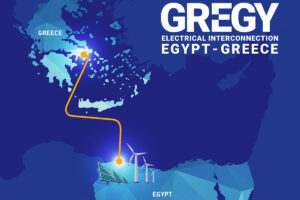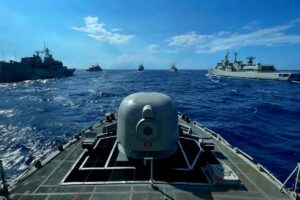Nordic Monitor unveils full invasion plan against Greece – How US and French presence has derailed the offensive. An Attack on Thrace and the Aegean was planned by Islamist Erdoğan. Turkey’s emergency war plans against Greece, focused primarily on Western Thrace and the Aegean islands, have suffered a serious setback due to the expanded military presence of the United States and France in support of Greek defence.
This has triggered a wave of sharp criticism of Turkey’s leadership, including President Recep Tayyip Erdoğan, in recent years. According to a report by the Nordic Monitor, the entire secret Turkish invasion plan against Greece has now been revealed, based on evidence disclosed during the “Sledgehammer” (Balyoz) trial in Istanbul in 2010.
At the time, the revelations drew little attention, likely because they were buried in the annexes of the case file, which primarily revolved around an internal power struggle between influential military commanders and the civilian government.
However, overwhelming evidence from the case file—including verified documents, recordings, and General Staff reports—confirmed that detailed war plans were indeed discussed during a military seminar held from 5–7 March 2003, under the leadership of then-Commander of the 1st Army Corps, General Çetin Doğan.
Approximately 30 senior officers attended the seminar.
Turkey’s strategy for a potential invasion of Greek territory—particularly in Western Thrace—was designed to exploit a narrow window of opportunity, which Turkish generals anticipated would quickly close following swift intervention by the US and Europe in the event of a Turkish assault.
Based in Istanbul, the 1st Army Corps is tasked with defending Turkey’s Thrace region, which borders Greece, as well as securing the Bosporus Strait, Istanbul, and the broader Sea of Marmara area.
Representatives from the Turkish General Staff and other military units also participated in the seminar.
The central element of the war plan was a military operation in the Aegean, with complementary actions in the Thrace region of Greece to support the main theatre.
The planners emphasised that any military action in Thrace should not focus on territorial conquest but rather on inflicting maximum damage on enemy forces. The goal was punishment, not occupation.
“Measures to be taken in Thrace must support the operation in the Aegean,” stated the final seminar report. “The objective in that region should be less about territorial gains and more about the destruction of as many enemy forces as possible.”
A summary of the classified seminar report was presented to participants in a PowerPoint presentation, a copy of which was later obtained by the Nordic Monitor.
The seminar also revealed the prevailing mindset among Turkish military leaders at the time, particularly those with anti-American and anti-NATO views.
Although Erdoğan initially clashed with these officers, he ultimately formed a decade-long political alliance with them and their political supporters—collectively known as the Ulusalcılar (neo-nationalists)—in 2014.
According to the seminar report, Turkish generals anticipated that NATO and the EU would intervene quickly if Turkey launched a military attack on Greece’s Thrace region.
Consequently, they concluded that Turkey would have only three to four days to achieve its objectives—enough time to inflict significant damage on Greek forces, but not enough for a prolonged occupation.
The ultimate objective, they argued, was to seize control of the Aegean islands.
While these plans may have evolved, been revised, or updated over time, the fundamental structure and overarching goals are believed to have remained intact.
The Islamist President of Turkey, Recep Tayyip Erdoğan, delivering a speech in Antalya. Photo via X, Recep Tayyip Erdoğan, @RTErdogan, Turkish Presidency
However, the strategic landscape has changed dramatically—much to the frustration of Turkey’s war planners—making a military attack on Greece far more difficult than before.
Greece’s recent defence cooperation agreements with the US and France, particularly those granting the US expanded access to Greek military and naval bases, have significantly undermined Turkey’s invasion plans.
The presence of US troops at these installations greatly increases the risks for Turkey in targeting Greek military assets, as such actions could provoke direct confrontation with the United States—something Ankara is keen to avoid.
This is undoubtedly a key factor behind Ankara’s increasingly hostile rhetoric towards Washington’s defence involvement in Greece, and its strong opposition to the strengthening of Greece’s defence ties with both the US and France.
During a joint press conference with Hungarian Prime Minister Viktor Orbán in Ankara on 11 November 2021, President Erdoğan publicly voiced his frustration, stating:
“Greece itself has now become a base for the United States. I couldn’t even count the number of American bases in Greece—there are so many.
When you look at the map, Greece itself looks like an American military base. That’s the reality.
Why are all these bases being established, and for what purpose? We asked—my Defence Minister, my Foreign Minister, and I asked President Biden and others—and we keep getting evasive answers. They are not being sincere.
The neighbour they have chosen is the wrong one, and using Greece as a base in the Aegean is the wrong approach.”
Erdoğan has repeated similar criticisms of the US, Greece, and France at public rallies, while senior government and military officials have echoed the same talking points.
US officials have rejected Turkey’s allegations, arguing that American involvement with Greece is not intended as a threat to Turkey, which remains a NATO ally.
On 18 October 2022, US Ambassador to Turkey Jeff Flake posted on Twitter: “Our defence cooperation with Greece strengthens NATO’s eastern flank to support Ukraine and our NATO allies in Central and Eastern Europe. Our shared goal with Turkey and Greece is peace, security, and stability throughout the region.”
In recent years, US-Greece defence cooperation has intensified, marked by expanded joint military exercises, updated agreements, and increased military aid, elevating Greece’s role in regional and transatlantic security.
In 2019 and 2021, Greece and the US updated the 1990 Mutual Defence Cooperation Agreement (MDCA), granting US forces greater access to Greek bases, including Alexandroupolis, near the Turkish border, and the critical Souda Bay base in Crete.
The US has also sold billions of dollars in defence systems to Greece, assisted in the modernisation of its F-16 fighter jets, and is considering selling fifth-generation fighters to the Hellenic Air Force.
The US and Greek armed forces now participate in over 15 major joint military exercises annually.
The US presence in Alexandroupolis—a port just 40 kilometres from the Turkish border—has particularly alarmed Ankara.
The base serves as a vital transit hub for US and NATO forces transporting equipment to Eastern Europe, effectively bypassing the Turkish-controlled Bosporus Strait.
Similarly, the potential deployment of US troops to the Aegean islands has become another major irritation for Turkish leaders.
France, too, has strengthened Greece’s defence posture. In September 2021, Athens and Paris signed a landmark defence agreement pledging mutual military support in the event of an armed attack on either state.
The deal facilitated Greece’s procurement of advanced French weaponry, including Rafale fighter jets, missiles, frigates, and helicopters.
These developments have significantly constrained Turkey’s military flexibility and undermined its emergency invasion plans against Greece.
As a result, both Turkish political and military leaders have stepped up their criticism of the trilateral defence cooperation between Greece, the US, and France, viewing it as a direct obstacle to Turkey’s strategic ambitions in the region.
The report from the secret seminar suggests that Turkey’s hawkish rhetoric is not merely for domestic consumption, such as distracting public opinion from internal issues like economic hardship, unemployment, and rising consumer prices, or rallying electoral support during campaigns, as some analysts claim.
There is, in fact, real strategic intent behind Turkey’s belligerent posture towards Greece—an intent that cannot be dismissed or downplayed by the apologetic arguments of Turkish diplomats or pro-Turkish experts, who seek to obscure the picture by asserting that such rhetoric is solely intended for internal use.












